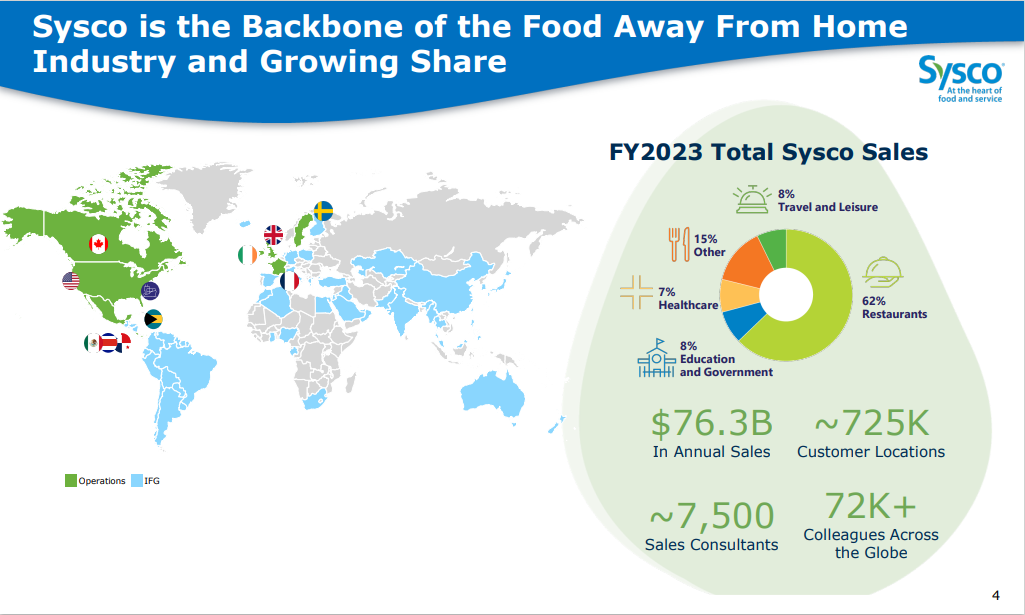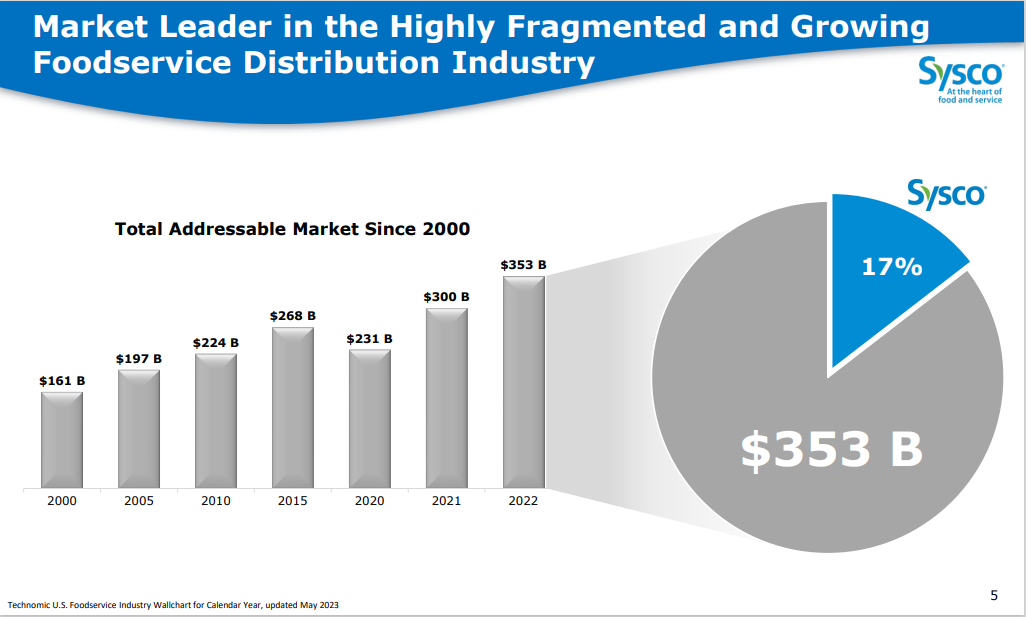Updated on September 22nd, 2023 by Bob Ciura
The Dividend Kings are a group of 50 companies with 50+ consecutive years of dividend increases. Broadly speaking, they are among the highest-quality dividend growth investments in the entire stock market.
You can see a full downloadable spreadsheet of all 50 Dividend Kings, along with several important financial metrics such as price-to-earnings ratios and dividend yields, by clicking on the link below:
Food distributor Sysco Corporation (SYY) has a long history of steady dividends and regular dividend increases. It has paid a dividend every quarter since it went public in 1970.
Sysco has many attractive qualities as a dividend growth stock. It is the largest company in its industry, providing high-profit margins and durable competitive advantages.
It also has long-term growth potential and the ability to increase its dividend each year.
Business Overview
Sysco was founded in 1969 and went public the following year. In its first year as a publicly-traded company, it had sales of just $115 million. The company has grown steadily over the nearly five decades since. In the 2023 fiscal year, Sysco had sales of $76.3 billion.
Today, Sysco is the largest wholesale food distributor in the U.S. It distributes products including fresh and frozen foods and dairy and beverage products. It also provides other products, including tableware, cookware, restaurant and kitchen supplies, and cleaning supplies.
Source: Investor Presentation
The company has a wide range of customers, including restaurants, healthcare facilities, education, government offices, travel, leisure, and retail businesses. It also has a large segment of other customer types, such as bakeries, churches, civic and fraternal organizations, vending distributors, and international exports.
In all, Sysco has approximately 700,000 customer locations. Its position atop the food distribution industry provides Sysco with high-profit margins and future growth potential.
Growth Prospects
The operating climate for Sysco was challenged over the past two years as the coronavirus pandemic forced closures of restaurants and other dining venues that make up Sysco’s customer base. Also, supply chain issues across the country affected Sysco.
On August 1st, 2023, Sysco reported fourth-quarter results for Fiscal Year (FY) 2023. In the fourth quarter, Sysco achieved a 4.1% sales increase compared to the same period in the previous fiscal year, with U.S. Foodservice volume rising by 2.3%. Adjusted EPS rose by 16.5% to $1.34, compared to the previous fiscal year.
For the entire fiscal year 2023, Sysco grew revenue by 11% with a 5.2% rise in U.S. Foodservice volume. Adjusted earnings-per-share increased 23% to $4.01.
In our view, the combination of organic sales growth, acquisition-added revenue growth, and share repurchases is expected to result in 7% annual earnings-per-share growth.
We believe this is an attainable goal due to the company’s robust business model and impressive competitive advantages. The company is also in the process of cutting overhead costs, which should mildly boost bottom-line
growth.
Competitive Advantages & Recession Performance
The U.S. food service industry is fiercely competitive. There are thousands of competitors to Sysco, including other food distributors, wholesale or retail outlets, grocery stores, and online retailers. Sysco also faces the risk of its customers negotiating directly with its suppliers.
However, Sysco is the largest operator in the industry and has kept competitors at bay for so many years. Sysco estimates that it controls about 17% of the approximately $300+ billion annual food service market in the U.S., giving it lots of room to continue expanding.
Source: Investor Presentation
Sysco operates ~333 distribution facilities worldwide and serves roughly 700,000 customer locations. Such a huge presence allows Sysco to keep costs low, and it can pass on the benefits to its customers with competitive pricing.
Another benefit of Sysco’s business model is that it is resistant to recessions. Everyone has to eat, which gives Sysco a certain level of demand, regardless of the condition of the U.S. economy.
This is why Sysco’s profits held up well during the Great Recession:
- 2007 earnings-per-share of $1.60
- 2008 earnings-per-share of $1.81 (13% increase)
- 2009 earnings-per-share of $1.77 (2% decline)
- 2010 earnings-per-share of $1.99 (12% increase)
Sysco grew earnings-per-share at a double-digit pace in 2008 and 2010, with only a mild dip in 2009. The company grew earnings from 2007 to 2010, which was a rare achievement.
Sysco’s stable industry and top competitive position have allowed it to raise its dividend each year, even during recessions.
Valuation & Expected Returns
Sysco is expected to produce adjusted earnings-per-share of $4.30 in fiscal 2024. The stock has a forward price-to-earnings ratio of 16.0.
Our fair value estimate is a price-to-earnings ratio of 20.0, which means the stock is currently trading below fair value. Growing to this target valuation would increase annual returns by 4.6% over the next five years.
We also expect Sysco to deliver 7% annual earnings growth going forward, consisting of organic growth, acquisitions, and share repurchases.
In addition, Sysco has a current dividend yield of 2.9%, which is a higher yield than the average yield of the broader S&P 500 Index. This leads to total expected annualized returns of 14.5% annually over the next five years.
Sysco should have little trouble increasing its dividend going forward. The company has an expected dividend payout ratio of 48% for fiscal 2024. This indicates that the dividend is sufficiently covered and should continue to increase over time.
Final Thoughts
Sysco operates at the top of its industry. Though it faced severe headwinds during the pandemic, the forward outlook is bright.
The stock is undervalued, meaning right now could be an opportune time to purchase the stock. We believe future returns will be strong for investors buying the stock at the current valuation level.
As a result, Sysco remains a quality holding within a dividend growth portfolio and a buy at the current price.
The following articles contain stocks with very long dividend or corporate histories, ripe for selection for dividend growth investors:
- The High Yield Dividend Aristocrats List is comprised of the 20 Dividend Aristocrats with the highest current yields.
- The Dividend Achievers List is comprised of ~400 stocks with 10+ years of consecutive dividend increases.
- The High Yield Dividend Kings List is comprised of the 20 Dividend Kings with the highest current yields.
- The Blue Chip Stocks List: stocks that qualify as Dividend Achievers, Dividend Aristocrats, and/or Dividend Kings
- The High Dividend Stocks List: stocks that appeal to investors interested in the highest yields of 5% or more.
- The Monthly Dividend Stocks List: stocks that pay dividends every month, for 12 dividend payments per year.
- The Dividend Champions List: stocks that have increased their dividends for 25+ consecutive years.
Note: Not all Dividend Champions are Dividend Aristocrats because Dividend Aristocrats have additional requirements like being in The S&P 500. - The Dividend Contenders List: 10-24 consecutive years of dividend increases.
- The Dividend Challengers List: 5-9 consecutive years of dividend increases.
- The Best DRIP Stocks: The top 15 Dividend Aristocrats with no-fee dividend reinvestment plans.
- The High ROIC Stocks List: The top 10 stocks with high returns on invested capital.
- The High Beta Stocks List: The 100 stocks in the S&P 500 Index with the highest beta.
- The Low Beta Stocks List: The 100 stocks in the S&P 500 Index with the lowest beta.
- The Complete List of Russell 2000 Stocks
- The Complete List of NASDAQ-100 Stocks


